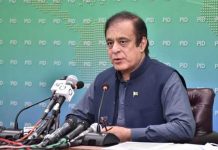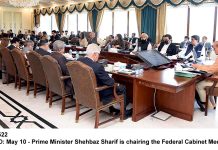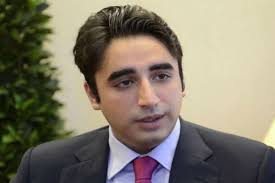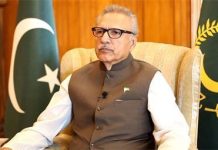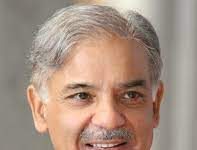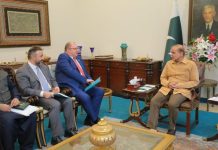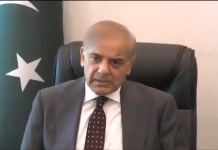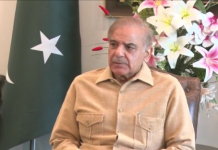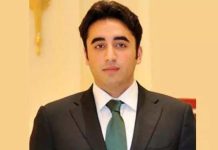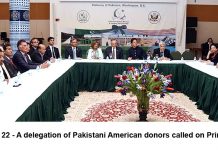ISLAMABAD: Senate Secretary Amjed Pervez Malik, while briefing the Association of Secretaries General of Parliament (ASGP), on Wednesday, said the parliament of Pakistan had dynamically taken legislative and deliberative initiatives to address challenging situations and overcome crises.
He said the ever changing dynamics of crises have necessitated multi-stratum responses at the state and international levels, pushing the national parliaments right to the centre of crisis management. Senate secretary presented his paper at the ASGP meeting being held simultaneously on the ‘Role and workings of the parliament in crisis situations’ at the 137th IPU Assembly being held in Saint Petersburg, Russia.
Regarding parliaments’ role in crisis situations, senate secretary said that crisis management remained an unquestioned domain of the executive in the past, with parliaments, despite overseeing government action, given a limited role in many countries. He informed since the restoration of democracy in Pakistan in 2008 and democratic transfer of power from one elected government to another, the role of parliament increased in crisis management in the country.
Sharing the success stories, he said the success of anti-terror military campaigns, such as the 2009 Operation Rah-e-Rast, Operation Rah-e-Nijat, and the on-going Operation Radd-ul-Fasaad, had the complete backing, support and political consensus of the parliament. He remarked the parliament also played a front-runner role in putting in place a firm constitutional and legal framework through relevant constitutional amendments and new laws to address the threat of terrorism and extremism through legal dimensions. A National Action Plan had been chalked out which had crossed political parties, institutions, provincial lines or boundaries ownership, he said.
He said the recent Afghanistan policy speech by U.S. President Donald Trump, where he levelled false accusations against Pakistan and questioned its integrity in fighting terrorism in the region, created a bilateral and inter-state crisis situation. The first response to this crisis situation was a unanimous voice in both houses of the Pakistan Parliament, where parliamentarians rejected the Trump narrative and dubbed the accusations as baseless. However, it was senate which played a lead role in crisis handling, he said. Malik said that he referred the matter to the Senate Committee of the Whole, constituted to prepare policy guidelines in the light of emerging regional realities and the role of United States. The committee held extensive consultations with the foreign office and the defence ministry and came up with initial parliamentary response guidelines which steered Pakistan’s policy and diplomatic stance in the crisis situation, the senate chairman remarked.
He said, all Pakistan missions abroad were advised to share the senate’s guidelines and Pakistan’s perspective on the evolving situation. Moreover, as per the guidelines, a meeting of Pakistan ambassadors posted abroad was convened in Islamabad to formulate a comprehensive diplomatic response. And finally, a meeting of the Parliamentary Committee on National Security was convened to discuss the issue, he said.
The recent visits of the foreign minister to China, Turkey and United States were in tandem with one of the policy guidelines, was to initiate a regional diplomatic initiative in consultation with friendly countries, Malik said.
He further stated that Pakistan Parliament played an exemplary role in addressing and diffusing the crisis situation arising out of the US-led NATO force’s attack on Pakistani security forces at two Pakistani military check-posts at Salala, resulting in 28 casualties of Pakistani troops, which threatened to derail Pakistan-NATO anti-terror cooperation in November 2011.
However, Pakistan Parliament evolved a specialized institutional framework in this regard by constituting a special parliamentary crisis management and response forum in the form of Parliamentary Committee on National Security, Malik said. “A joint session of the parliament was convened passing a joint resolution “calling for an urgent review of the national security strategy and revisiting the methodology of combating terrorism in order to restore peace and stability through an independent foreign policy”, he said. The resolution also called for constituting “a special committee of parliament to periodically review, provide guidelines and monitor the implementation of the principles framed and roadmap given in this resolution,” he said. As a result, the Parliamentary Committee on National Security was constituted, Malik said. The committee held a total of 63 meetings averaging 16 meetings per year till March 2012. He said the committee finalized a total of 16 “guidelines for revised terms of engagement with USA/ NATO/ISAF, and general foreign policy”, and submitted the same to a joint session of the parliament on March 20th, 2012.
Addressing the ASGP, senate secretary further informed that as an aftermath of the deadly attack on Army Public School Peshawar in 2014 which claimed 141 lives, a National Action Plan was developed by the parliamentary parties as per a collective political consensus of the parliament.
On the Yemen crisis, a joint parliamentary session was summoned after the Saudi government approached Pakistan for assistance in the conflict that began after Saudi Arabia started conducting air strikes against Houthi forces in Yemen, Malik stated. He informed that lawmakers approved a draft resolution proposing that Pakistan “should maintain neutrality in the conflict so as to be able to play a proactive diplomatic role to end the crisis”. Following parliamentary guidelines, Pakistan avoided becoming entangled in a regional crisis situation, that otherwise could have entailed serious diplomatic and bilateral consequences for Pakistan, he said.
The senate secretary further briefed the ASGP meeting that democratically elected parliament, through collective political wisdom and institutional consensus, efficiently and amicably handled the crisis situations with positive results. He observed that individual dictator or solely executive-led handling of crisis minus parliament may bring about quick response or temporary solutions but lacked broader vision and deep wisdom that only parliament can guarantee. The institution of parliament can help bring about peaceful and mutually acceptable solutions to the crisis situations. He said the proactive role of the parliament in crisis handling has two dimensional advantages. Firstly, it helps executive of the country in sustaining undue pressure and not change policies on one telephonic call without taking the nation on board. On the other hand, the properly debated, deliberated and planned change of course by a nation is only possible through continuous parliamentary involvement and leading role. Otherwise, the fight against terrorism or any societal menace remains cosmetic and temporarily leading to contradictory situations, Malik explained.
In the end, the senate secretary proposed to the ASGP forum that the UN, multilateral organisations, and think tanks and media must accord more recognition and space to the role of parliament in addressing crisis situations. At the same time, IPU must strive for developing institutional mechanisms at the UN to facilitate enhanced parliamentary representation, and engagement in UN debates and proceedings relating to crisis resolution, he said.
Moreover, in addition to constitutional and legislative interventions, parliament must strive to conceive and bring into use specialised procedural; devices and tools such as special committees and forums for crisis resolution, Malik further recommended.
Published in Daily Times, October 18th 2017.

